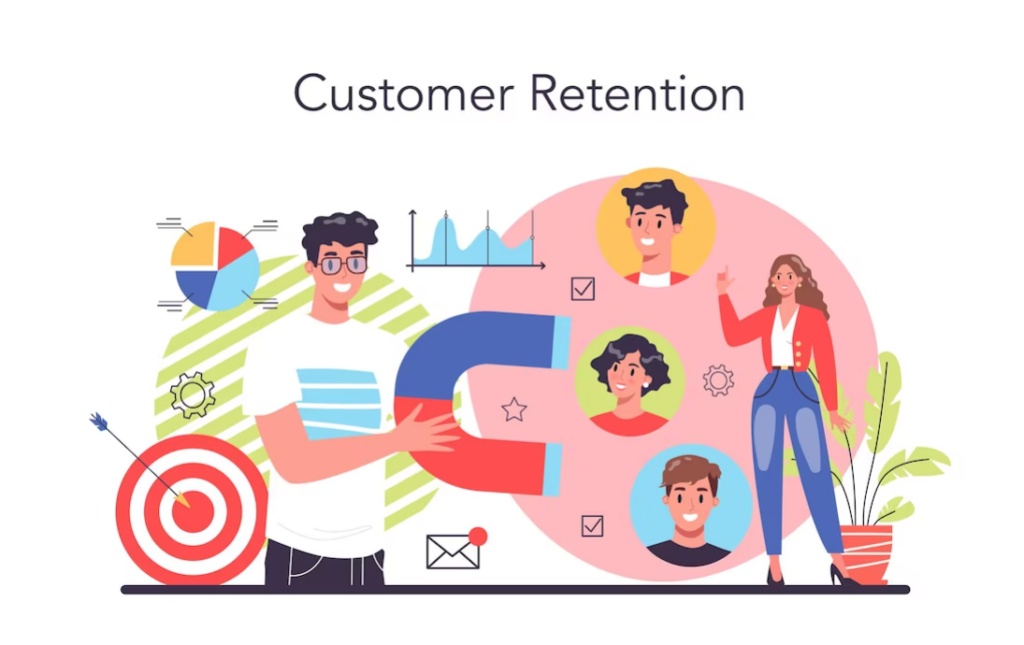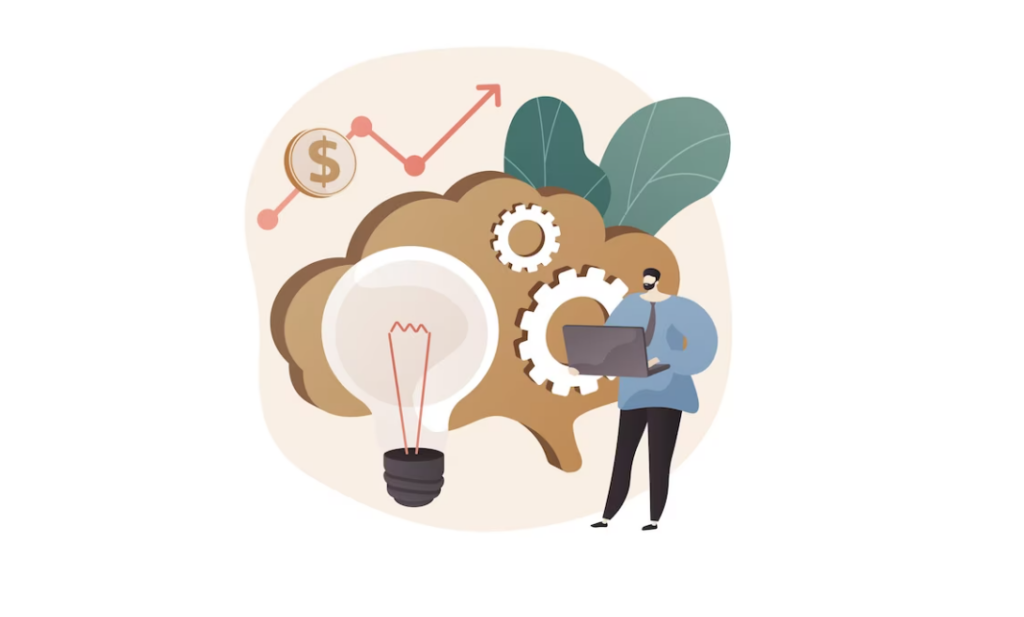
Key Takeaways
- Automated tracking and segmentation of website visitors enable targeted messaging and personalized experiences for precise retargeting efforts.
- Personalized messaging based on user behavior increases engagement, builds customer loyalty, and boosts conversions in e-commerce.
- Simplified A/B testing and optimization of campaign elements refine marketing campaigns for better results and higher conversion rates.
- Marketing automation journeys create highly targeted and personalized customer experiences throughout the sales funnel, nurturing leads and optimizing interactions.
- Email automation streamlines communication, enables timely follow-ups, and nurtures customer relationships for higher engagement and conversions.
- Email automation saves time, reaches a larger audience, and improves cost efficiency by maximizing the impact of each email communication.
In the ever-evolving world of eCommerce, standing out from the crowd and capturing the attention of potential customers is a constant challenge.
This is where marketing automation swoops in as a game-changer, revolutionizing the way businesses approach their retargeting campaigns.
Picture this: a seamless, personalized customer journey, where tailored messages and offers appear at just the right moment, enticing shoppers to convert with irresistible ease.
That’s the power of marketing automation for eCommerce retargeting campaigns.
In this article, we’ll unravel the captivating benefits that await businesses when they embrace marketing automation.
Get ready to unlock a world of increased conversions, streamlined operations, and data-driven success.
Let’s dive in and discover what are the benefits of marketing automation that can transform your eCommerce retargeting efforts into a captivating and profitable journey.
Benefits of marketing automation
A. Streamlined campaign management

Marketing automation offers several benefits for streamlining campaign management in eCommerce.
Let’s explore the advantages in more detail, while incorporating the provided keywords:
1. Automated tracking and segmentation of website visitors
E-commerce marketing automation software enables businesses to track and segment website visitors automatically.
By analyzing user behavior, demographics, and purchase history, businesses can gain insights into their audience and create targeted messaging and personalized experiences.
This segmentation allows for more precise retargeting efforts, ensuring that the right messages reach the right people at the right time.
2. Personalized messaging based on user behavior
One of the key benefits of marketing automation for e-commerce is the ability to deliver personalized messages to users based on their specific actions and interests.
By utilizing automation, businesses can create dynamic marketing automation journeys that adapt to users’ behavior and preferences.
This personalized approach increases engagement, builds customer loyalty, and ultimately boosts conversions.
3. Simplified A/B testing & optimization of campaign elements
Marketing automation platforms provide robust A/B testing capabilities, making it easier for businesses to experiment with different campaign elements.
By testing variables such as subject lines, call-to-action buttons, content variations, and even automation workflows, businesses can optimize their campaigns for maximum effectiveness.
This iterative process enables continuous improvement, ensuring that each element of the campaign is refined based on data-driven insights, leading to better results and higher conversion rates.
4. Benefits of email automation
Email automation is a powerful feature within marketing automation platforms.
It allows businesses to automate various stages of the customer journey, including welcome emails, abandoned cart reminders, order confirmations, and post-purchase follow-ups.
The benefits of email automation include improved engagement, increased customer retention, and higher revenue generation.
Businesses can leverage automation to send timely, personalized emails that nurture customer relationships, drive conversions, and promote brand loyalty.
5. Automated retail commerce reviews
Marketing automation can also streamline the process of collecting and promoting customer reviews for e-commerce businesses.
By automating review request emails or integrating with third-party review platforms, businesses can gather valuable feedback and social proof.
Automated review campaigns can encourage satisfied customers to leave reviews, boosting credibility and trust, while negative reviews can trigger prompt customer service interventions.
6. Advantages of marketing automation journeys
Marketing automation journeys offer businesses the advantage of creating highly targeted and personalized customer experiences.
These journeys map out a series of automated touchpoints that are triggered based on user behavior, allowing businesses to guide customers through the sales funnel effectively.
From awareness to conversion and beyond, automation journeys enable businesses to nurture leads, provide relevant content, and optimize customer interactions at every stage of the journey.
B. Enhanced customer engagement

Marketing automation for ecommerce brings numerous benefits to customer engagement.
1. Timely and relevant communication with potential customers
E-commerce marketing automation software enables businesses to send automated messages to potential customers at the right time in their customer journey.
By setting up triggers and workflows, businesses can deliver targeted messages, such as welcome emails, abandoned cart reminders, and personalized recommendations.
This timely and relevant communication helps keep potential customers engaged, increases brand awareness, and nudges them closer to making a purchase.
2. Customized content delivery based on user preferences
With marketing automation, businesses can segment their audience based on various criteria, such as demographics, purchase history, and browsing behavior.
This segmentation allows businesses to deliver highly personalized content to each segment.
By tailoring content to match user preferences, businesses can provide a more personalized and engaging experience.
This customized content can include product recommendations, special offers, and relevant information that aligns with the specific interests and needs of each customer segment.
3. Multi-channel reach to maximize customer touchpoints
E-commerce marketing automation platforms offer multi-channel capabilities, enabling businesses to engage with customers across various channels.
From email to SMS, social media, push notifications, and more, businesses can leverage multiple touchpoints to reach their customers effectively.
This multi-channel approach increases the chances of capturing customer attention, as customers can be engaged through their preferred communication channels.
By utilizing marketing automation, businesses can maintain consistent messaging across channels, ensuring a cohesive and integrated customer experience.
4. Benefits of email automation
Email automation is a powerful component of marketing automation for ecommerce.
It allows businesses to set up automated email campaigns triggered by specific customer actions or events.
For example, businesses can automatically send personalized emails to customers who have abandoned their carts, offering incentives or reminding them to complete their purchase.
Email automation streamlines communication, enables timely follow-ups, and nurtures customer relationships, ultimately leading to higher engagement and increased conversions.
5. Leveraging marketing automation journeys
Marketing automation journeys play a crucial role in enhancing customer engagement.
These journeys map out a series of automated touchpoints that guide customers through their unique buying journeys.
By analyzing customer behavior and preferences, businesses can design personalized automation journeys that deliver relevant content and offers at each stage.
These tailored journeys provide a seamless and engaging experience, keeping customers actively involved and increasing the likelihood of conversion.
6. Benefits of personalized product recommendations
Marketing automation allows businesses to leverage customer data and preferences to deliver personalized product recommendations.
By analyzing past purchases, browsing history, and similar customer profiles, businesses can automatically suggest relevant products to individual customers.
Personalized product recommendations not only enhance the customer experience but also increase the chances of cross-selling and upselling, thereby boosting customer engagement and revenue.
C. Increased conversion rates

E-commerce marketing automation offers several strategies to boost conversion rates.
1. Targeted product recommendations and offers
Marketing automation for e-commerce enables businesses to leverage user data and behavior to provide targeted product recommendations and offers.
By analyzing purchase history, browsing behavior, and customer preferences, businesses can deliver personalized recommendations that align with each customer’s interests.
These targeted recommendations and offers increase the likelihood of conversion by presenting customers with products they are likely to be interested in, enhancing their shopping experience and encouraging them to make a purchase.
2. Cart abandonment recovery through automated reminders
One of the significant challenges in e-commerce is cart abandonment.
Marketing automation tools help businesses recover lost sales by automatically sending reminders to customers who have abandoned their shopping carts.
These automated reminders serve as gentle prompts, reminding customers about their abandoned items and encouraging them to complete their purchase.
Additionally, businesses can offer incentives such as discounts or free shipping to incentivize customers to finalize their transactions.
Cart abandonment recovery through automation significantly improves conversion rates by re-engaging potential customers who showed clear intent to purchase.
3. Dynamic retargeting to display relevant ads across platforms
Marketing automation enables businesses to engage in dynamic retargeting, a powerful strategy to boost conversion rates.
By tracking user behavior and interactions with the business, automation platforms can display personalized and relevant ads to users across different platforms they visit.
For example, if a customer has viewed a specific product on an e-commerce website, they may encounter ads for that product on social media or other websites they visit.
This dynamic retargeting approach reinforces brand awareness, keeps products top-of-mind, and encourages customers to return to complete their purchase, resulting in improved conversion rates.
4. Benefits of email automation for conversion optimization
Email automation plays a vital role in optimizing conversions in e-commerce. Businesses can set up automated email campaigns triggered by specific customer actions or events.
For instance, sending a series of automated emails to nurture leads, follow up with potential customers, or re-engage inactive customers can significantly impact conversion rates.
By delivering personalized and timely content through email automation, businesses can build trust, address customer concerns, and provide incentives that motivate customers to take action, ultimately increasing conversion rates.
5. Advantages of marketing automation journeys for conversion optimization
Marketing automation journeys are powerful tools for optimizing conversions.
These journeys map out a sequence of automated touchpoints tailored to each customer’s unique journey.
By leveraging user data and behavior, businesses can design automation journeys that guide customers through the sales funnel, providing relevant content, personalized offers, and compelling calls-to-action at each stage.
Marketing automation journeys ensure consistent and strategic communication, nurturing customer relationships, and driving conversions with increased efficiency and effectiveness.
6. Leveraging social proof through automated retail commerce reviews
Marketing automation can help businesses leverage social proof to improve conversion rates.
By automating the collection and display of customer reviews and ratings, businesses can showcase positive feedback and testimonials, instilling confidence in potential customers and influencing their purchase decisions.
Automated retail commerce reviews serve as powerful social proof, enhancing credibility and trust, and ultimately boosting conversion rates.
D. Improved cost efficiency

E-commerce marketing automation brings significant cost efficiency benefits.
1. Reduction in manual labor and human error
Marketing automation for e-commerce minimizes the need for manual labor and reduces the risk of human error.
By automating repetitive tasks such as data entry, campaign execution, and reporting, businesses can save valuable time and resources.
Automation ensures that processes are executed consistently and accurately, eliminating the possibility of human error.
This reduction in manual labor and human error leads to increased efficiency and cost savings for businesses.
2. Optimal allocation of marketing resources
With marketing automation, businesses can allocate their marketing resources more effectively.
By automating routine and repetitive tasks, marketers can focus their time and effort on strategic activities that require human creativity and expertise.
For example, instead of spending hours manually segmenting and sending emails, automation allows marketers to concentrate on crafting compelling content, refining strategies, and analyzing campaign performance.
The optimal allocation of marketing resources maximizes productivity, enhances campaign quality, and ultimately leads to improved cost efficiency.
3. Higher ROI through efficient campaign execution
Marketing automation offers businesses the opportunity to achieve higher return on investment (ROI) by streamlining campaign execution.
Automation tools enable businesses to set up and deploy campaigns efficiently, eliminating the need for manual intervention at each step.
Automated workflows, email sequences, and customer journeys ensure that campaigns run smoothly and consistently.
By automating repetitive processes, businesses can optimize campaign performance, drive better results, and achieve higher ROI with minimal effort.
This efficient campaign execution translates into cost savings and improved financial outcomes.
4. Benefits of email automation for cost efficiency
Email automation, a key component of marketing automation, contributes to cost efficiency in several ways.
Firstly, it eliminates the need for manual email sending, saving significant time and effort.
Secondly, automation allows businesses to send personalized and targeted emails at scale, reaching a larger audience without requiring additional resources.
Thirdly, by automating email campaigns, businesses can achieve higher open rates, click-through rates, and conversions, resulting in improved cost efficiency by maximizing the impact of each email communication.
5. Marketing automation journeys for streamlined processes
Marketing automation journeys play a vital role in improving cost efficiency.
These journeys map out the entire customer lifecycle and automate various touchpoints, ensuring consistent and timely communication.
By automating processes such as lead nurturing, onboarding, and customer retention, businesses can streamline their operations and achieve greater efficiency.
Marketing automation journeys eliminate the need for manual intervention at each stage, allowing businesses to scale their operations without a proportional increase in resources, thus enhancing cost efficiency.
6. Improved campaign tracking and analytics
E-commerce marketing automation software provides robust tracking and analytics capabilities, allowing businesses to measure the effectiveness of their campaigns and make data-driven decisions.
By automating data collection and analysis, businesses can gain valuable insights into campaign performance, customer behavior, and ROI.
This improved tracking and analytics enable businesses to optimize their marketing strategies, allocate resources more effectively, and identify opportunities for cost savings and revenue growth.
E. Advanced analytics and reporting

E-commerce marketing automation offers advanced analytics and reporting capabilities, providing businesses with valuable insights into campaign performance, customer behavior, and data-driven decision-making.
1. Real-time tracking of campaign performance
Marketing automation for e-commerce enables businesses to track the performance of their retargeting campaigns in real-time.
With access to real-time analytics, businesses can monitor key metrics such as click-through rates, conversion rates, and revenue generated.
This real-time tracking empowers businesses to make immediate adjustments and optimizations to their campaigns, ensuring that they are on track to meet their goals.
Real-time tracking also allows businesses to identify underperforming areas and implement corrective measures promptly, improving overall campaign performance.
2. Deep insights into customer behavior and preferences
E-commerce marketing automation software provides businesses with deep insights into customer behavior and preferences.
By analyzing customer interactions, engagement patterns, and purchase history, businesses can gain a comprehensive understanding of their target audience.
This knowledge allows businesses to segment their customers more effectively, personalize their retargeting campaigns, and deliver relevant content and offers.
Understanding customer behavior and preferences empowers businesses to create more compelling and impactful retargeting strategies, increasing the chances of conversions and customer satisfaction.
3. Comprehensive analytics for data-driven decision-making
Marketing automation platforms offer comprehensive analytics capabilities, providing businesses with the data they need to make informed decisions.
By analyzing data collected through automation, businesses can identify trends, patterns, and opportunities for optimization.
This data-driven decision-making approach enables businesses to refine their retargeting campaigns, allocate resources effectively, and identify areas where they can maximize their marketing efforts.
With automation analytics, businesses can optimize their retargeting strategies based on real insights, enhancing their overall marketing performance.
4. A/B testing and optimization
E-commerce marketing automation allows businesses to conduct A/B testing and optimize their retargeting campaigns.
By testing different variations of campaign elements such as ad copy, visuals, call-to-action buttons, and landing page layouts, businesses can gather data on which variations perform best.
This iterative testing and optimization process enables businesses to fine-tune their retargeting campaigns.
It helps to ensure that they are delivering the most impactful messages and experiences to their target audience.
A/B testing and optimization are key components of data-driven decision-making, helping businesses achieve better results and drive continuous improvement.
5. Reporting and performance measurement
Marketing automation platforms provide robust reporting functionalities that allow businesses to generate detailed reports on campaign performance.
These reports offer insights into key metrics, conversions, customer engagement, and ROI.
Businesses can track the effectiveness of their retargeting campaigns over time, compare performance across different segments or channels, and identify areas for improvement.
Reporting and performance measurement help businesses evaluate the success of their retargeting efforts, optimize their strategies, and demonstrate the value of marketing automation to stakeholders.
6. Predictive analytics for future campaigns
Advanced marketing automation platforms leverage predictive analytics to forecast future outcomes based on historical data.
By analyzing past campaign performance, customer behavior, and market trends, businesses can make predictions about the success of future retargeting campaigns.
Predictive analytics provide valuable insights into customer preferences, product demand, and potential opportunities.
This foresight enables businesses to develop proactive retargeting strategies, allocate resources effectively, and stay ahead of the competition.
F. Scalability and growth potential

E-commerce marketing automation provides advanced analytics and reporting capabilities that contribute to the success of retargeting campaigns.
1. Ability to handle large volumes of customer data
Marketing automation platforms are equipped to handle large volumes of customer data.
This scalability allows businesses to manage and analyze extensive customer databases without experiencing performance issues.
By efficiently processing and organizing customer data, businesses can gain valuable insights into customer behavior, preferences, and purchase history.
This in-depth understanding of customer data enables businesses to personalize their retargeting campaigns effectively and deliver targeted messaging that resonates with their audience.
2. Automated scaling of campaigns as business expands
As businesses experience growth and expansion, marketing automation offers the flexibility to scale retargeting campaigns seamlessly.
Automation tools allow businesses to easily manage and optimize larger campaigns, accommodating a growing customer base.
By automating processes such as audience segmentation, content creation, and campaign deployment, businesses can ensure consistent messaging and personalized experiences across a larger audience.
The ability to scale campaigns efficiently helps businesses maintain their competitive edge and capture new market opportunities.
3. Continuous optimization based on performance data
Marketing automation enables businesses to continuously optimize their retargeting campaigns based on real-time performance data.
By monitoring key metrics such as click-through rates, conversion rates, and revenue generated, businesses can identify areas for improvement and make data-driven adjustments.
Automation tools provide insights into campaign performance, customer engagement, and behavior patterns, allowing businesses to refine their retargeting strategies and improve conversion rates.
Continuous optimization based on performance data ensures that campaigns stay relevant, effective, and aligned with the evolving needs of the target audience.
4. Advanced reporting and visualization
E-commerce marketing automation software offers advanced reporting and visualization features that simplify the analysis of campaign performance.
These tools generate comprehensive reports that provide clear insights into the success of retargeting campaigns, customer engagement, and ROI.
Businesses can access visual representations of data through charts, graphs, and dashboards, making it easier to interpret and share key findings with stakeholders.
Advanced reporting capabilities help businesses measure the effectiveness of their retargeting efforts, identify areas of improvement, and make informed decisions for future campaigns.
5. Integration with other marketing tools and systems
Marketing automation platforms often offer integrations with other marketing tools and systems, enhancing their overall functionality.
Integration with customer relationship management (CRM) systems, email marketing platforms, and data analytics tools allows businesses to leverage the full potential of their marketing ecosystem.
By centralizing data and streamlining processes through integration, businesses can create more cohesive and targeted retargeting campaigns.
This integration further improves the efficiency and effectiveness of marketing efforts, leading to enhanced customer engagement and higher conversion rates.
6. Predictive analytics and forecasting
Some advanced marketing automation platforms leverage predictive analytics to forecast future outcomes based on historical data. By analyzing past campaign performance, customer behavior, and market trends, businesses can make predictions about the success of future retargeting campaigns. Predictive analytics provide valuable insights into customer preferences, product demand, and potential opportunities. This foresight enables businesses to develop proactive retargeting strategies, allocate resources effectively, and stay ahead of the competition.
Case Studies and Examples
E-commerce marketing automation has proven to be highly beneficial for retargeting campaigns, as demonstrated by numerous success stories and examples in the industry.
1. Success stories of eCommerce businesses using marketing automation for retargeting
Many eCommerce businesses have experienced remarkable success by implementing marketing automation for their retargeting campaigns.
These success stories serve as powerful examples of the benefits that automation can bring.
Case studies highlight how businesses have achieved increased customer engagement, higher conversion rates, improved customer retention, and overall revenue growth through the strategic use of marketing automation.
These examples provide real-world evidence of how automation can positively impact an eCommerce business’s bottom line.
2. Key metrics and results achieved through automated campaigns
Sharing specific metrics and results obtained from automated retargeting campaigns adds credibility to the benefits of marketing automation.
By presenting metrics such as conversion rates, click-through rates, revenue uplift, and return on investment (ROI), businesses can showcase the measurable impact of automation on their retargeting efforts.
These key performance indicators provide tangible evidence of the effectiveness of marketing automation in driving positive business outcomes.
Examples of businesses achieving significant increases in conversion rates, higher revenue generated from retargeted customers, and improved overall campaign performance reinforce the advantages of marketing automation for eCommerce.
3. Customized case studies for different industries and business sizes
Marketing automation case studies can be tailored to specific industries and business sizes, highlighting the versatility and scalability of the approach.
By presenting case studies that are relevant to a particular industry or business type, businesses can better understand how marketing automation can be applied to their unique circumstances.
For instance, case studies can showcase how small-to-medium-sized eCommerce businesses successfully implemented marketing automation to streamline their retargeting campaigns and achieve notable results.
Customized case studies resonate with businesses that are looking for practical examples that closely align with their specific goals and challenges.
4. Examples of automation workflows and strategies
Showcasing examples of automation workflows and strategies used in retargeting campaigns can inspire businesses to explore the possibilities of marketing automation further.
By illustrating how automation can be implemented at various stages of the customer journey, businesses can visualize the potential impact on customer engagement and conversion rates.
Examples can include automation of cart abandonment emails, personalized product recommendations based on browsing behavior, dynamic content in email campaigns, and automated upsell and cross-sell strategies.
Providing these examples helps businesses understand the versatility of marketing automation and encourages them to leverage automation techniques that align with their specific retargeting goals.
5. Testimonials and reviews from businesses using marketing automation
Testimonials and reviews from eCommerce businesses that have successfully implemented marketing automation add credibility and real-world insights.
By sharing the experiences and feedback of businesses that have embraced automation, prospective users can gain confidence in the effectiveness and benefits of marketing automation for retargeting campaigns.
These testimonials can highlight how automation has streamlined their marketing processes, improved campaign performance, and enhanced customer experiences.
Positive reviews and success stories from other eCommerce businesses serve as valuable references when considering the adoption of marketing automation.
6. Industry benchmarks and comparisons
Industry benchmarks and comparisons provide a broader perspective on the benefits of marketing automation for retargeting campaigns.
By presenting data on average conversion rates, customer engagement metrics, and revenue growth within specific industries, businesses can see how marketing automation can help them outperform industry standards.
Comparisons between businesses that have implemented automation and those that have not can highlight the advantages gained from using marketing automation software for retargeting purposes.
These industry benchmarks and comparisons offer a quantitative perspective on the benefits of marketing automation and can guide businesses in setting realistic goals and expectations.
Case studies, examples, key metrics, testimonials, industry benchmarks, and comparisons collectively illustrate the benefits of e-commerce marketing automation for retargeting campaigns.
Potential challenges and strategies
Implementing e-commerce marketing automation for retargeting campaigns brings numerous benefits, but businesses may face certain challenges along the way.
It is essential to address these challenges effectively to maximize the advantages of automation.
1. Overcoming implementation and integration hurdles
The implementation of marketing automation for e-commerce retargeting campaigns may require technical expertise and seamless integration with existing systems.
To overcome these challenges, businesses should conduct thorough research to select a suitable automation platform that aligns with their specific requirements.
Partnering with knowledgeable providers who offer comprehensive support and training can facilitate a smooth implementation process.
Additionally, investing in employee training & development to ensure effective communication across teams can foster a successful integration of marketing automation software.
2. Ensuring data privacy and compliance
With the collection and processing of customer data, businesses must prioritize data privacy and comply with applicable regulations such as GDPR or CCPA.
Ensuring that their data handling practices are GDPR compliant helps maintain customer trust and avoid potential legal repercussions.
To mitigate risks, businesses should implement robust security measures to safeguard customer data, including encryption and access controls, and a (Privileged Access Management) PAM solution.
Obtaining necessary consents from customers, clearly communicating data handling practices, and providing opt-out options are essential for maintaining trust and compliance.
Regular audits and assessments of data handling practices can further ensure adherence to privacy regulations.
3. Continuous monitoring and improvement of automated processes
Marketing automation requires ongoing monitoring and optimization to ensure optimal performance.
Businesses should regularly analyze campaign results, including key metrics such as open rates, click-through rates, and conversion rates, to identify areas for improvement.
Promptly addressing any issues or bottlenecks in the automation workflow can enhance campaign effectiveness.
Staying updated with automation trends through industry research, attending webinars, and participating in training programs.
It helps businesses adapt and optimize their automated processes to meet evolving customer expectations.
4. Managing customer expectations and personalization
While marketing automation enables personalized messaging, businesses must strike the right balance between automation and human touch.
Over-reliance on automation without considering individual customer preferences and expectations may lead to impersonal or irrelevant communication.
To mitigate this challenge, businesses should regularly review and update customer segmentation criteria to ensure targeted and relevant messaging.
Incorporating dynamic content and personalization variables within automated campaigns can enhance the customer experience and foster meaningful connections.
5. Building customer trust and maintaining engagement
Automation should not undermine the customer relationship or lead to disengagement. It’s crucial to strike a balance between automated messages and genuine human interactions.
Providing options for customers to reach out to a real person, offering exceptional customer support, and incorporating interactive elements within automated communications can help businesses maintain customer trust and foster engagement.
6. Alignment with evolving customer preferences and market trends
Customer preferences and market trends change over time.
To address this challenge, businesses should regularly review and update their automation strategies to align with evolving customer expectations.
Conducting market research, monitoring industry trends, and soliciting customer feedback can provide valuable insights for adapting automation journeys and campaigns accordingly.
Conclusion
As the digital landscape continues to evolve at breakneck speed, staying ahead of the curve in eCommerce is no longer a luxury but a necessity.
Marketing automation emerges as the secret weapon, empowering businesses to create unforgettable customer experiences that drive conversions and fuel growth.
By harnessing the power of automation, businesses can streamline their retargeting campaigns, engage customers on a deeper level, and optimize their strategies for maximum impact.
The benefits are undeniable: increased conversion rates, optimized resource allocation, and valuable insights into customer behavior.
So, don’t settle for mediocre results. Embrace marketing automation and unleash its captivating potential in your eCommerce retargeting campaigns.
Get ready to captivate, convert, and conquer the digital marketplace like never before. The future of eCommerce success is within your reach, powered by the captivating force of marketing automation.
